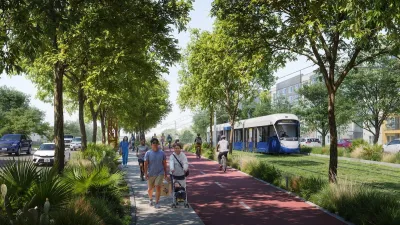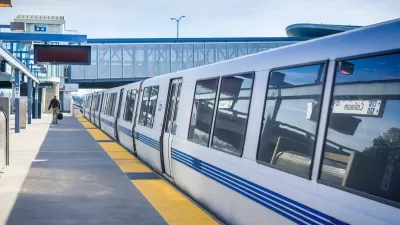BOSTON -- If you've ever studied the bar menu at Trader Vic's then you know about such wonders as Tropical Passion, Moku Nani, and the Potted Parrot. Each is made of a unique but secret blend of dark rum, light rum, spiced rum, tropical juices, and of course "subtle flavorings." But by the time you'd realize that the only real difference is the glass they come in, you're too probably drunk to notice--or care. Minus the palm fronds, the RailVolution conference is much the same.
BOSTON -- If you've ever studied the bar menu at Trader Vic's then you know about such wonders as Tropical Passion, Moku Nani, and the Potted Parrot. Each is made of a unique but secret blend of dark rum, light rum, spiced rum, tropical juices, and of course "subtle flavorings." But by the time you'd realize that the only real difference is the glass they come in, you're too probably drunk to notice--or care.
Minus the palm fronds, the RailVolution conference is much the same.
I could hardly decide which sessions to attend this weekend, at RailVolution's 15th annual installment in Boston, because, in truth, they all sounded like different versions of each other. One the one hand, that's OK. Trains are almost as much fun as cocktails, and the number of speakers testifies to the nation's renewed enthusiasm for rail at all scales. It's still tough, though, to fill 100 workshops, panels, and plenaries without recycling speakers and topics like so much island punch.
What will I learn at "An Intoduction to "Streetcars and Their Role in Building Liveable Communities" that I didn't already find out in "Streetcars and Market Dynamics"? Will I secure more funds if I listen to "Financing the Public Realm" than "Financing Livable Communities"? Who will inspire me more: "Growing Better, Greener, and Denser: Suburban to Urban" or "Creating 'Green' Communities" or "Going Green with Transit: Macro and Micro"? Which of the six sessions featuring New Starts guru Jeff Boothe should I attend? Which of them comes in a scorpion bowl?
These and many other overlaps make it nearly impossible to decide which session to attend, but they testify to the popularity of trail and to the number of advocates who now have something to say -- even if what they're saying isn't necessarily original. Harder to assess is the depth to which these ideas have permeated two key constituencies: the voters and transit bureaucracies who really hold the key to laying track.
RailVolution rightly claims to be one of the leading rail-advocacy events in the country, and for years it, along with all mass-transit advocacy groups, against indifference and cultural inertia at all scales and levels of government. No doubt, innovations are still arising. There are sessions on how transit agencies use social media, and of course there is rampant discussion about the federal stimulus and the Obama Administration's support of rail. I wouldn't say that there's a spirit of optimism at this year's conference, but the good news is that determination is in abundance.
Thanks in no small part to RailVolution itself, which is in its 15th year, rail has gone mainstream and, if we had the funds and a political infrastructure with which to disburse them, plenty of public and private advocates would be laying the tracks for everything from trolleys to national bullet trains. But, as many sessions make all too clear, the time from determination to delivery is going to require patience. In other words, we'll probably be hearing the same stories for years to come.
While the nation was spending the past few decades not building rail, some remarkable coalitions have formed, and once-dismissed ideas have risen into the mainstream. Thanks in large part to our bowtied bartender/conductor, the heroic U.S. Rep. Earl Earl Blumenauer, Republican (j/k!) of Portland, rail is now associated with livability, walkabilty, bikeabilty, gentrification, commerce, real estate development, greening, equity, urban economies, information economies, greening, health, and so much more. These are the ingredients of RailVolution's menu that are becoming so familiar.
Overlapping sermons and tough scheduling choices are perhaps the questions that arise when a movement becomes mature: so many people are in agreement that they are literally saying the same thing. Unfortunately, they'll probably continue to do so for decades to come until of America's hoped-for trains start chugging (including $500 billion estimated by the White House for national high-speed rail).
The best news about RailVolution is that if all goes well, you'll someday be able to have your mai tai and not have to worry about wrecking your car (or bike) if you're foolish enough to try to get home on your own. All aboard for the hangover express!

Planetizen Federal Action Tracker
A weekly monitor of how Trump’s orders and actions are impacting planners and planning in America.

Map: Where Senate Republicans Want to Sell Your Public Lands
For public land advocates, the Senate Republicans’ proposal to sell millions of acres of public land in the West is “the biggest fight of their careers.”

Restaurant Patios Were a Pandemic Win — Why Were They so Hard to Keep?
Social distancing requirements and changes in travel patterns prompted cities to pilot new uses for street and sidewalk space. Then it got complicated.

Platform Pilsner: Vancouver Transit Agency Releases... a Beer?
TransLink will receive a portion of every sale of the four-pack.

Toronto Weighs Cheaper Transit, Parking Hikes for Major Events
Special event rates would take effect during large festivals, sports games and concerts to ‘discourage driving, manage congestion and free up space for transit.”

Berlin to Consider Car-Free Zone Larger Than Manhattan
The area bound by the 22-mile Ringbahn would still allow 12 uses of a private automobile per year per person, and several other exemptions.
Urban Design for Planners 1: Software Tools
This six-course series explores essential urban design concepts using open source software and equips planners with the tools they need to participate fully in the urban design process.
Planning for Universal Design
Learn the tools for implementing Universal Design in planning regulations.
Heyer Gruel & Associates PA
JM Goldson LLC
Custer County Colorado
City of Camden Redevelopment Agency
City of Astoria
Transportation Research & Education Center (TREC) at Portland State University
Camden Redevelopment Agency
City of Claremont
Municipality of Princeton (NJ)






























